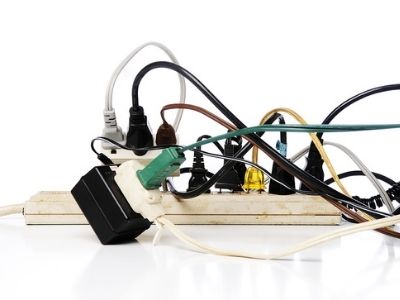
Electrical Safety Tips from Local Electricians
Readily available electricity in every home is a modern miracle, but that miracle comes at a price. By its very nature, electricity is a dangerous utility. It is the cause of thousands of residential fires every year, and it can cause electrocutions and damage to electronics. Since it is a constant presence in every home, homeowners should be familiar with electrical safety.
This May, make electrical safety a top priority. This brief article gives recommendations from local electrical safety experts that can help every home be safer from the hazards of electricity.
Stop Putting Too Many Devices on an Outlet
When an outlet was overloaded in the past, it would more easily trip a breaker. Nowadays, it is more likely to overheat the outlet. Some ideas to help spread out electrical loads are:
- Use surge protectors instead of power strips since they will trip before an outlet overheats.
- Even though each room is on its circuit, spreading electrical devices to multiple outlets will protect the outlets from overheating.
- Turn off surge protectors when not in use– this will also reduce electrical usage from “vampire loads.”
- Remember, devices that produce heat or power, like hairdryers and vacuums, will use more energy and put a higher load on an outlet. Use these in separate outlets.

Follow Recommended Wattages
It is essential to pay attention to wattage. This has become more difficult in recent years as light bulbs are phased out to LEDs. “Wattage” is a term that describes how much power a device uses. Typical incandescent light bulbs use between 60 and 100 watts. LEDs use between 10 and 20 watts.
When changing light bulbs, remember always to follow the recommended wattage. This information is located on the base of every light fixture and lamp produced. Whether incandescent or LED bulbs are used, always ensure the wattage is equal to or below the recommended wattage.
When wattages are exceeded, the light fixture will overheat. In some cases, the institution will melt. In extreme cases, an electrical fire can occur.
Always Hire Professional Help
Electricity is dangerous when it falls outside the boundaries of building codes. Unfortunately, too many DIYers will attempt to do their electrical work, which usually results in a hazardous situation. Always leave electrical work to professionals who know proper code guidelines and are licensed and insured.
When homeowners hire professional electricians, they invest in their property and protect it. If accidents happen under the guidance of an electrician, insurance protects everyone involved. If accidents result from unlicensed work, homeowners are on the line for complications, and they will have voided their own personal homeowner's insurance.
About Gillece Services
Gillece Services has been providing residents in the Pittsburgh area with options that best fit their needs and budget since 1980. They offer financing options, flat-rate pricing, and a rewarding membership plan. Call them today for electrical services in Bridgeville, PA.
Distribution Links +
- wicz.com
- htv10.tv
- rfdtv.com
- snntv.com
- central.newschannelnebraska.com
- metro.newschannelnebraska.com
- southeast.newschannelnebraska.com
- midplains.newschannelnebraska.com
- northeast.newschannelnebraska.com
- plattevalley.newschannelnebraska.com
- panhandle.newschannelnebraska.com
- rivercountry.newschannelnebraska.com
- wpgxfox28.com
- lifestyle.mykmlk.com
- wtnzfox43.com
- lifestyle.3wzfm.com
- lifestyle.southernsportstoday.com
- lifestyle.thepodcastpark.com
- lifestyle.680thefan.com
- lifestyle.xtra1063.com
- lifestyle.953hlf.com
- lifestyle.rewind1019.com
- lifestyle.us983.com
- lifestyle.countrylegends1059.com
- lifestyle.967wshv.com
- lifestyle.1045thedan.com







